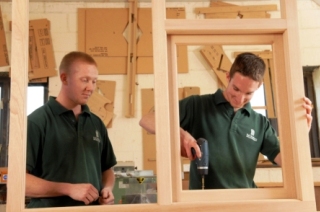 In the BWF’s pre-budget submission to the Chancellor of the Exchequer George Osborne, BWF Chief Executive Iain McIlwee has outlined proposals to boost the fortunes of joinery manufacturers through ensuring that growth is shared equally and in a timely fashion throughout the supply chain.
In the BWF’s pre-budget submission to the Chancellor of the Exchequer George Osborne, BWF Chief Executive Iain McIlwee has outlined proposals to boost the fortunes of joinery manufacturers through ensuring that growth is shared equally and in a timely fashion throughout the supply chain.
The letter, which was sent in advance of next month’s Budget announcement, focused on four main themes:
Bad payment practice continues to undermine the market
The issue of poor payment practice and unrealistic contractual expectations are crippling elements of the supply chain, starving business of the capital and confidence to drive investment and support growth.
Participation in fair payment charters (including fair contractual terms) should immediately be set as a pre-requisite of any companies involved in public sector contracts. Retentions are now typically around 5% of the amount certified as due to the contractor and the latest official figures show average profit within the manufacturing sector falling back to levels of around 5.5% in 2015, the lowest rate since 2012. It is simply unacceptable for large companies at the top of the supply chain, most able to manage and insure against risks and delays, to push virtually all risk out onto a fragmented supply chain, destroying jobs and ultimately leaving the market exposed to new waves of imported products.
At the same time, the safety nets for smaller businesses are simply not there and when companies find cash in short supply, the banks remain risk adverse and often expect significant personal assets to be put against loans to support investment and bridge periods when cash-flow rather than volume of work are the issue. This problem must be addressed now as the current drive to eliminate it by 2025 will be too late for many firms, their workers and families.
Supporting UK Manufacturing
As well as being fully renewable, UK joinery manufacturing is emerging as an almost zero waste process – biomass energy and ever more sophisticated panel products are consuming virtually all production and end of life waste. We must not let the warning bells rung by the steel industry go unheeded. Import penetration remains a major risk to the trade gap and this puts UK jobs and investment under threat.
As it stands, government projects (>£10 million) must now take into account embodied carbon and whole life cost for steel. We would like to see this thinking extended across all construction inputs and are investing in new software enabling our members to simply declare environmental credentials against new and effective standards. Even before a building is occupied, between 30-50% of its lifetime carbon emissions have already been accounted for and this needs to be factored in to specification decisions.
Cost of doing business
Profit is necessary for businesses – it does not only cover paying the shareholders (who will typically work long hours and carry huge responsibilities) but also helps to generate the funds necessary to invest in the future and prepare for rainy days.
Low energy manufacturing must be incentivised, job creation and investment never penalised and the Business Rate review should establish that no company is required to pay more. When trying to drive investment, it makes no sense to include plant and machinery in rateable value.
Nurturing the skills needed to meet demand
We should be looking at clearing systems for apprentices in order to prevent wastage and also help to target interested parties with information and informed choice. Developing a meaningful and scalable interface with schools is a priority as adequate careers guidance in schools is now non-existent. This is not the fault of schools as they are being pushed towards academic subjects but there is a fundamental failure to help young people to understand the choices they have, let alone prepare them for them. Careers advice should be an intrinsic part of teacher training. It may now be the time to consider vocational routes into teaching to help bolster understanding and respect for the apprentice’s journey.
Here you can view the complete BWF letter to the Chancellor.